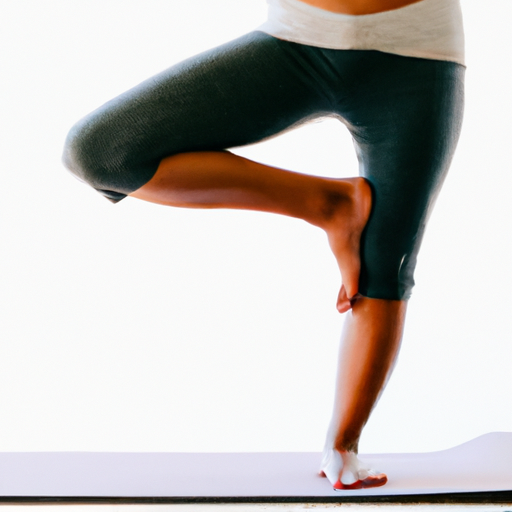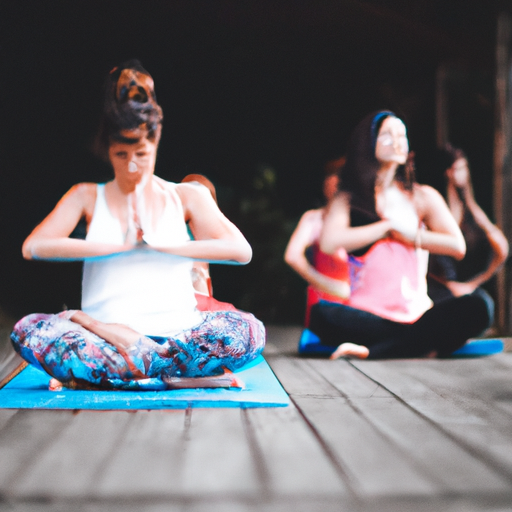Have you ever wondered if physical practices, such as yoga or exercise, can actually help you become more empowered in your own life? Many people have found that engaging in these activities not only improves physical health but also has a profound impact on their mental well-being. By challenging yourself physically, you can tap into your inner strength and resilience, ultimately leading to a greater sense of personal empowerment. In this article, we will explore the potential benefits of incorporating physical practices into your daily routine and how they can positively influence your overall sense of empowerment. So, get ready to discover the incredible potential that lies within your own body and mind!
Benefits of Physical Practices for Personal Empowerment
Improved Mental Health
Engaging in physical practices, such as yoga or exercise, can greatly contribute to improved mental health. Regular physical activity has been proven to release endorphins, which are natural mood enhancers. These endorphins help reduce stress, anxiety, and symptoms of depression. By incorporating physical practices into your routine, you can experience a boost in your overall mental well-being.
Increased Physical Strength and Endurance
When you engage in regular physical practices, you gradually build strength and endurance. Whether it’s through yoga poses or strength training exercises, you will notice your muscles becoming stronger and more toned over time. This increase in physical strength not only empowers you physically, but it also reinforces a sense of accomplishment and confidence in your abilities.
Enhanced Self-Confidence and Body Image
Physical practices play a significant role in enhancing self-confidence and improving body image. As you progress in your chosen practice, whether it’s mastering a challenging yoga pose or achieving a new personal best in exercise, you gain a sense of accomplishment that boosts your self-esteem. Additionally, physical practices help you develop a deeper appreciation and respect for your body, leading to improved body image and self-acceptance.
Stress Reduction and Emotional Well-being
One of the most significant benefits of physical practices is their ability to alleviate stress and promote emotional well-being. Engaging in yoga or exercise helps release tension and negative energy from the body, leaving you feeling more relaxed and grounded. These practices also provide an opportunity for self-reflection and introspection, allowing you to process emotions and cultivate a greater sense of emotional well-being.
Enhanced Cognitive Functioning
Physical practices have been shown to enhance cognitive functioning. Regular exercise increases blood flow to the brain, stimulating the growth of new neural connections and improving memory and cognitive abilities. Similarly, the mindfulness and focus cultivated through yoga practice have been associated with improved concentration and mental clarity. By engaging in physical practices, you can empower yourself intellectually and enhance your overall cognitive functioning.
Yoga as a Personal Empowerment Practice
Yoga for Mind-Body Connection
Yoga is a powerful practice that cultivates the mind-body connection. Each yoga pose is designed to synchronize breath, movement, and awareness, enabling you to become fully present in the moment. Through this integration of mind and body, yoga helps you understand and connect with your physical and emotional experiences on a deeper level. Developing this mind-body connection can lead to a greater sense of personal empowerment.
Increased Self-Awareness and Mindfulness
Practicing yoga allows you to cultivate self-awareness and mindfulness. As you move through different poses and pay attention to your breath, you become more attuned to your body’s sensations and subtle shifts in energy. This increased self-awareness extends beyond the yoga mat and into your daily life, helping you make conscious choices that align with your values and goals. By practicing mindfulness, you can empower yourself to live more intentionally.
Building Resilience and Coping Skills
Yoga practice can help you build resilience and develop effective coping skills. By challenging yourself physically and mentally on the mat, you learn to navigate discomfort and find balance amidst adversity. This ability to adapt and bounce back from challenging situations translates into your daily life, empowering you to face life’s obstacles with greater courage and resilience. Through yoga, you can acquire valuable tools to cope with stress and adversity, ultimately leading to personal empowerment.
Promoting Self-Reflection and Self-Discovery
Yoga provides a space for self-reflection and self-discovery. As you move through various poses and engage in breathing exercises, you create an opportunity for introspection and self-inquiry. This introspective process allows you to explore your inner thoughts, emotions, and beliefs, leading to a deeper understanding of yourself. Through self-reflection and self-discovery, yoga empowers you to make conscious choices and align your actions with your authentic self.

Exercise and Personal Empowerment
Physical Fitness for Empowered Living
Engaging in regular exercise is a key component of personal empowerment. By focusing on physical fitness, you invest in your overall well-being and quality of life. Regular exercise improves cardiovascular health, strengthens muscles, and increases flexibility, ultimately enhancing your physical capabilities and performance. Embracing physical fitness empowers you to live an active and fulfilling life.
Boosting Self-Efficacy and Motivation
Regular exercise has a profound impact on self-efficacy and motivation. When you set fitness goals and witness your progress, you build confidence in your ability to achieve what you set out to do. The sense of accomplishment that comes with reaching milestones or mastering new exercises fuels your motivation to continue challenging yourself and striving for personal growth. By engaging in exercise, you can boost your self-efficacy and maintain a positive, motivated mindset.
Improving Energy Levels and Productivity
Exercise has a remarkable ability to improve energy levels and boost productivity. When you engage in physical activity, endorphins are released, providing a natural energy boost that can carry you through the day. Regular exercise also improves sleep quality and reduces fatigue, allowing you to wake up refreshed and ready to tackle tasks. By incorporating exercise into your routine, you can enhance your productivity and empower yourself to accomplish more.
Fostering Discipline and Goal Setting
Exercise requires discipline and goal setting, both of which contribute to personal empowerment. When you commit to a regular exercise routine and set specific goals, you develop discipline and a strong work ethic. This discipline extends beyond the realm of exercise and permeates other areas of your life, fostering a sense of self-control and inner strength. By practicing discipline and goal setting through exercise, you empower yourself to achieve success in various aspects of your life.
The Role of Group Activities
Social Support and Empowerment
Engaging in physical practices as part of a group activity provides social support and empowers individuals. Joining a yoga class, workout group, or sports team creates a sense of community and belonging. The collective energy and encouragement from fellow participants can boost motivation and empower individuals to push beyond their limits. By surrounding yourself with supportive like-minded individuals, you foster an environment of empowerment and personal growth.
Accountability and Motivation through Community
Participating in group activities offers a valuable sense of accountability and motivation. When you exercise or practice yoga alongside others, there is a shared commitment to showing up and giving your best effort. This mutual accountability helps individuals stay consistent and motivated, even when faced with challenges or setbacks. The support and encouragement from the community keep individuals focused on their goals and empower them to overcome obstacles together.
Facilitating Collaboration and Networking
Group physical activities provide an opportunity for collaboration and networking. Whether it’s partnering up for yoga poses or participating in team sports, engaging in physical practices alongside others enhances teamwork skills and fosters connections. Collaboration with others can lead to shared learning experiences, increased creativity, and a broader perspective. By engaging in group activities, you open doors to new relationships and empower yourself through collaborative efforts.

Overcoming Limiting Beliefs and Barriers
Challenging Negative Self-Talk
Physical practices, such as yoga or exercise, can help challenge negative self-talk and cultivate a positive mindset. When engaging in these practices, you learn to shift your focus from self-doubt and criticism to self-compassion and self-encouragement. Over time, you can rewire negative thought patterns and replace them with empowering beliefs. By challenging negative self-talk, you empower yourself to overcome limiting beliefs and embrace a more positive and confident mindset.
Breaking Physical and Mental Barriers
Physical practices push you to break through physical and mental barriers. Whether it’s holding an advanced yoga pose or achieving a new personal record in exercise, these practices challenge you to go beyond your comfort zone and expand your limitations. Breaking through these barriers builds resilience and is a testament to your inner strength. By overcoming physical and mental barriers, you empower yourself to conquer challenges and unlock your full potential.
Reframing Perception and Self-Limitations
Physical practices provide an opportunity to reframe perception and transform self-limitations into empowering beliefs. For example, engaging in yoga can challenge preconceived notions of what your body is capable of, allowing you to embrace body positivity and challenge societal beauty standards. By stepping outside of societal expectations and redefining your own limitations, you empower yourself to embrace your uniqueness and live authentically.
Cultivating a Growth Mindset
Physical practices foster a growth mindset, which is crucial for personal empowerment. A growth mindset is characterized by embracing challenges, valuing effort, and persisting in the face of setbacks. Through consistent engagement in physical practices, you develop a sense of resilience and a belief in your ability to grow and improve. By cultivating a growth mindset, you empower yourself to embrace continuous learning, personal development, and success in all areas of your life.
Integrating Physical Practices into Daily Life
Routines and Commitment
Integrating physical practices into your daily life requires establishing routines and committing to regular engagement. Block off specific times in your schedule dedicated to yoga or exercise, treating them as non-negotiable appointments with yourself. By creating a consistent routine and demonstrating commitment to your physical practices, you empower yourself to prioritize your well-being and make personal growth a priority.
Setting Realistic Goals and Expectations
Incorporating physical practices into your daily life involves setting realistic goals and expectations. Begin by identifying what you want to achieve and break it down into manageable steps. Setting small, achievable goals provides a sense of accomplishment and empowers you to progress in your practice. Be patient with yourself and understand that progress takes time. By setting realistic goals and expectations, you empower yourself to pursue sustainable and long-lasting personal growth.
Finding Balance and Prioritizing Self-Care
Integrating physical practices into your daily life requires finding balance and prioritizing self-care. While it’s important to engage in physical practices regularly, it’s equally crucial to listen to your body’s needs and avoid overexertion. Make time for rest and recovery, allowing your body to heal and recharge. By finding the balance between physical activity and rest, you empower yourself to maintain a sustainable and holistic approach to personal empowerment.

Considering Individual Preferences and Needs
Finding the Right Physical Practice
When it comes to physical practices, it’s important to find the one that resonates with your individual preferences and needs. Explore different options, such as yoga, strength training, martial arts, or dance, and see which activity aligns with your interests and goals. Consider your personality, physical abilities, and what brings you joy and fulfillment. By finding the right physical practice for you, you empower yourself to engage in an activity that resonates with your authentic self.
Tailoring Exercise to Personal Interests
Tailoring exercise to your personal interests is key to maintaining long-term commitment and enjoyment. If you’re not a fan of traditional gym workouts, explore alternative options like hiking, swimming, or cycling. Look for activities that align with your passions and incorporate them into your exercise routine. By incorporating activities that you genuinely enjoy, you empower yourself to stay motivated and derive pleasure from your physical practices.
Adapting Practices for Different Age Groups
Physical practices can be adapted to cater to different age groups and abilities. Whether you’re a teenager, young adult, middle-aged, or a senior, there are modifications and variations available to ensure safe and effective engagement. Consult with professionals, such as fitness trainers or yoga instructors, who can provide guidance on adapting practices to suit your age and physical needs. By adapting physical practices, you empower yourself to engage in activities that promote your overall well-being at any stage of life.
Addressing Physical Limitations
Physical limitations should be acknowledged and addressed when engaging in physical practices. If you have any pre-existing injuries or medical conditions, it’s crucial to consult with healthcare professionals before starting any new exercise or yoga program. They can provide recommendations, modifications, and advice to ensure your safety and avoid aggravating any existing conditions. By addressing physical limitations, you empower yourself to engage in physical practices in a way that supports your overall health and well-being.
Creating a Supportive Environment
Creating Positive Surroundings
Creating a supportive and empowering environment is essential when engaging in physical practices. Surround yourself with positive influences, whether it’s friends, family, or like-minded individuals who uplift and motivate you. Additionally, create a physical space that encourages your physical practices. Dedicate a tranquil corner for yoga or set up a home gym that inspires you to exercise. By creating positive surroundings, you empower yourself to stay motivated and create an environment conducive to personal growth.
Seeking Professional Guidance and Instruction
When embarking on physical practices, seeking professional guidance and instruction can significantly contribute to your overall experience and progress. Enroll in yoga classes taught by certified instructors or work with a personal trainer who can design a customized exercise program. These professionals offer expert knowledge, proper form, and guidance tailored to your needs. By seeking professional guidance, you empower yourself to optimize your physical practices and achieve your goals safely and effectively.
Building a Support Network
Building a support network is invaluable when engaging in physical practices. Find people who share your interests and goals, whether it’s attending group classes or joining online communities. Surrounding yourself with individuals who understand and support your journey fosters a sense of camaraderie and can provide encouragement during challenging times. By building a support network, you empower yourself with a strong foundation of like-minded individuals who share your enthusiasm for personal empowerment.

Transforming Challenges into Opportunities
Embracing the Journey and Learning Process
Embarking on physical practices necessitates embracing the journey and learning process. Understand that progress is not always linear, and setbacks or plateaus are a natural part of personal growth. Embrace each experience as an opportunity for learning and personal development. By adopting a growth mindset and viewing challenges as stepping stones, you empower yourself to navigate obstacles with resilience and perseverance.
Building Resilience through Setbacks
Setbacks are inevitable when engaging in physical practices, but they provide valuable opportunities for building resilience. Whether it’s an injury, lack of progress, or a temporary lapse in motivation, setbacks test your resilience and determination. Use setbacks as learning experiences to reassess your goals, adapt your approach, and reaffirm your commitment. By building resilience through setbacks, you empower yourself to bounce back stronger and continue on your personal empowerment journey.
Harnessing Adversity for Personal Growth
Adversity can serve as a catalyst for personal growth when engaging in physical practices. Facing and overcoming challenges cultivates inner strength, self-confidence, and adaptability. Each time you overcome a hurdle, you prove to yourself that you are capable of accomplishing more than you believed. By harnessing adversity for personal growth, you empower yourself to transform obstacles into opportunities and emerge with newfound strength and determination.
Celebrating Progress and Achievements
Celebrating progress and achievements is essential for staying motivated and acknowledging your growth. Take time to reflect on how far you’ve come and the milestones you’ve reached on your physical empowerment journey. Whether it’s mastering a difficult pose, achieving a fitness goal, or experiencing increased energy and overall well-being, celebrate your accomplishments. By celebrating progress and achievements, you empower yourself to stay motivated, appreciate your journey, and inspire others.
Conclusion
Physical practices, such as yoga or exercise, undoubtedly aid in personal empowerment. From improved mental health and increased physical strength to enhanced self-confidence and stress reduction, the benefits are vast. Yoga fosters a mind-body connection, self-awareness, and resilience, while exercise boosts self-efficacy, energy levels, and discipline. Engaging in these practices within a supportive community and overcoming barriers empowers individuals to transform challenges into opportunities. By integrating physical practices into daily life, considering personal preferences and needs, creating a supportive environment, and embracing setbacks, individuals can embark on a journey of personal empowerment, growth, and achievement. So, whether you roll out your yoga mat or hit the gym, know that physical practices have the potential to propel you towards personal empowerment and a more fulfilling life.
